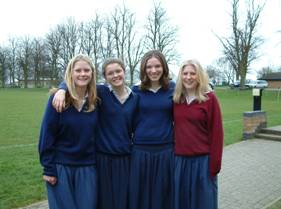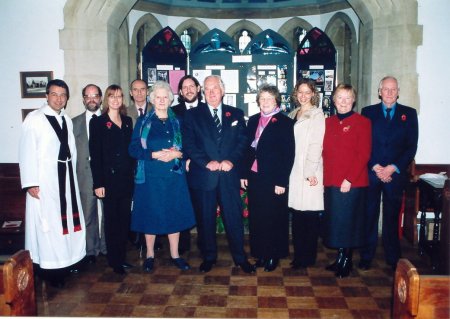|
OUNDLE SCHOOL SPONSORED BICYCLE
RIDE
Following the success of the sponsored bicycle ride
by the Princess of Wales Royal Regiment that raised
over £6,000 for the Thiepval Project in 2002, a second
sponsored ride was organised by four Oundelians.
They rode from Verdun to Ypres via Thiepval.
 |
Pictured from left to right, Tessa
Stanley-Price, Alice Ream,
Rosie Pollard and Hannah Lamb who bicycled from
Verdun
to Ypres.
They
also raised £6,000 !
|
Two hundred
and twenty six Old Oundelians died in the Great War
and on their way the girls visited the graves and
memorials of sixty of them. Ten are on the Thiepval
Memorial and eleven more have graves in the Somme
cemeteries.
The distance from Verdun to Ypres is 250 miles and
they arrived at Thiepval on the morning of Friday
18th July 2003 with the local French press and television
in attendance.
"Some Desperate Glory"
Her Majesty's
Theatre, Haymarket, London.
Performed on Armistice Sunday 2002,
Some
Desperate Glory
was a unique evening
performance of words, music and film about the Great
War.
Proceeds from ticket sales went towards the
Thiepval Visitor Centre.
The evening included poetry and prose performed by
some of the UK's top actors including:-
JIM
BROADBENT - MICHELLE BUTTERLY -
CHIWETEL EJIOFOR - SUSANNAH HARPER -
TONY HAYGARTH - SAEED JAFFREY -
JANE LAPOTAIRE - MICHAEL PENNINGTON -
SAMUEL WEST
Songs and music
were by COOPE,
BOYES and SIMPSON
There was also the premier
screening of War
Game based
on the book by Michael Foreman.
The works chosen for performance
included poetry and prose by Vera Britten Rudyard
Kipling, AA Milne, Wilfred Owen, Siegfried Sassoon,
John Masefield and Edward Thomas.
The event was the original idea
of Michael Morpurgo, the award-winning children's
writer.
The performance was directed by
Tim Supple, in association with The Really Useful
Group, the Wilfred Owen Association and the Western
Front Association.
The performance was generously
sponsored by Harper Collins Ltd.
The following is an
appreciation written by Helen McPhail.
What a remarkable evening it
was! Several hundred people in a West End theatre,
on the eve of Armistice Day, not sure what to
expect, together with some keyed-up promoters and a
dedicated and hard-working group of actors, singers
and theatre staff.
One man’s imaginative response
to a ‘begging letter’ was to tap into his
friendships and contacts to set up a unique
theatrical evening: the result was unforgettable,
impressive, immensely rewarding for the audience —
and for the Project’s funds. This was Michael
Morpurgo, the well-known children’s author who has
written very effectively for his young readership
about the First World War.
The evening opened with an air
played on the Northumberland pipes, introducing a
sequence of poems or prose extracts read by some of
our leading actors; between their contributions at
the microphone, each had his or her own chair set
around the stage, sitting with quiet concentration
against a plain black backing.
This simplicity of staging
enabled us, the audience, to concentrate equally in
response, for we were seeing first-rank actors,
generous with their time and expertise, who made
full use of theis plain setting to give the material
its full value: Jim Broadbent, Michelle Butterly,
Chewitel Ejiofor, Susannah Harker, Tony Haygarth,
Saeed Jaffrey, Jane Lapotaire, Michael Pennington
and Samuel West; the songs were performed by Coope,
Boyes and Simpson, offering their own songs that
interpreted life on the Western Front.
The readings presented authors
ranging from the familiar (Sassoon, Owen, Gurney,
Edward Thomas, Kipling, Graves, Vera Brittain) to
the some perhaps less well-known, or unfamiliar in
this context (Yeats, Rose Macaulay, Charles
Harrison, Herbert Read, Teresa Hooley, Eleanor
Farjeon, Ted Hughes, Claire Elise Tisdall, Margaret
Cole, John Masefield).
So far, so — perhaps —
predictable: but the second part of the evening
opened with the first public showing of a fine new
animated film, a prize-winning production of ‘War
Boy’ based on the children’s book of the same name
by Michael Foreman. A straightforward story told
with clarity and humanity, it showed how a cheerful
farm boy, and keen footballer, joined up in 1914
with his friends, what happened to him (including
the famous ‘Christmas Truce’) and how his family
felt.
The combination of actors
reading, the songs and the film brought this rich
material together for form a seamless whole, a
memorable occasion which left us all enriched in its
thoughtfulness and presentation.
Expenses were kept to an
absolute minimum (supported by the great generosity
of publishers HarperCollins and theatre managers The
Really Useful Company as well as by the performers’
willingness to give their own time); and everyone
concerned appreciated the professional skills of
director Tim Supple, who created a remarkable event
with the minimum of rehearsal time and the total
collaboration of the professional participants.
The intense and concentrated
silence throughout the evening was a tribute in
itself to the power of the material, and the skills
of those on stage. When Michael Morpurgo, the
original instigator of the occasion, came on stage
at the end of the evening and announced that ‘around
£5,000 - £6,000 would go the Thiepval Project’ the
applause was as great as for the performers
themselves. The hard work and whole-hearted
involvement of everyone who took part or who
sponsored the event encouraged and rewarded the
organisers for their months of preparation, and
enabled the fortunate audience to take away vivid
memories and lasting appreciation.
Helen Mcphail.
1st
December 2002.
return to top of
page
St. Peter’s Church, Bushey Heath – Remembrance
Service
On Sunday 10th November 2002, the Thiepval project
was pleased to be represented by Carol Nubbert at
the occasion of the Remembrance Service for the
re-dedication of the Great West Window at St.
Peter’s Church in Bushey Heath, which has recently
been restored.
In the months leading up to the Remembrance
Service, churchwarden of St. Peter’s, Bryon Parkin,
set out to investigate the origins of the Great
West Window, after he had noted the inscription at
the window’s base, which indicated that it had
been created in honour of Lt. Basil Perrin Hicks
of the 8th Battalion Berkshire Regiment.
He discovered that Basil Perrin Hicks was the
second son of William Mitchison Hicks, the
founding Vice-Chancellor of Sheffield University
and his wife Ellen Perrin. Educated at Rugby, and
Trinity College, Cambridge from where he graduated
in modern languages in 1914, Basil joined the Inns
of Court Training Corps and was gazetted 2nd Lt.
8th Berkshire Regiment in September 1914.
Promoted Lieutenant in March 1915, he was killed
in action at Hulluch, shot through the heart
whilst leading the scout section of his battalion
in the first attack at the Battle of Loos on 25th
September 1915. Lt. Hicks’ Commanding Officer
wrote of him “By his death the regiment has lost
not only a charming companion, but a very clever
and most promising officer in his special line –
map-making and the training of scouts – I shall
never be able to replace him. I was a great
admirer of his work and if only he had been
spared, I am sure he would have made a name for
himself. Nothing was too much trouble for him, and
the scouts, of whom he was in charge, just
worshipped him.” And a private who was with him
when he was killed pays this tribute “He was a
game one. He fell right on the German parapet, his
last words being ‘Good lads, come on – straight
ahead!” He was buried where he fell, but he was
later re-interred at Dud Corner Cemetery, Loos.
Henry Perrin, Lt. Hicks’ uncle, had the window
created by Henry Holiday in memory of his nephew.
Henry Holiday was an artist of some distinction,
who exhibited regularly at the Royal Academy from
about 1858 and is probably best known for his
painting ‘Dante and Beatrice’ which is now in the
Walker Art Gallery in Liverpool. In about 1861, he
turned his attentions to stained glass work and
became principal stained glass designer for the
old-established Whitefriars Glass Firm of Powell &
Sons. In 1891, he established his own glass-making
firm in Hampstead and his more notable commissions
include the Brunel Memorial Window in Westminster
Abbey, and windows in Trinity College, Cambridge
and in the Grace Cathedral in New York amongst
others. In Bushey, Holiday was responsible for two
items in St. Peter’s Church, the Great West or
Holy Trinity West Window and lights in the North
Aisle. He was also responsible for the chancel
East window in St. Margaret’s School Chapel
(Christ Blessing Children).
Due to his painstaking research, Mr. Parkin was
able to find relatives of Lt. Hicks, who attended
the remembrance service. Also present, were a
representative of Sheffield University where Lt.
Hicks’ father was the founding Vice-Chancellor and
who contributed towards the restoration, and
Arthur Tatham whose great-grandfather was
Commanding Officer of the 8th Berkshire Regiment.
Arthur has spent several years researching the
soldiers of his grandfather’s company from a
photograph found amongst his great-grandfather’s
possessions.
The family remembrance service at St. Peter’s
movingly commemorated all those who fell during
the two world wars, and the church service
collection of a most generous £500 was donated to
the Thiepval Project’s funds in memory of Lt.
Basil Perrin Hicks, for which we are very
grateful.
The picture below shows (from left to right):
Revd. Robbie Low (Vicar of St. Peter’s Church),
John Hawthorne (Sheffield University), Carol
Nubbert (Thiepval Project), Peter Craven (CWGC),
Miss Veronica Perrin, Arthur Tatham (Researcher),
Henry F. Perrin, Mrs. Hannah Perrin, Rachel Smith
(Window Restorer), Enid Jarvis (St. Margaret’s
School) and Bryon Parkin (Church warden).

The next pictures show the Great West Window in
its renewed splendour.
|